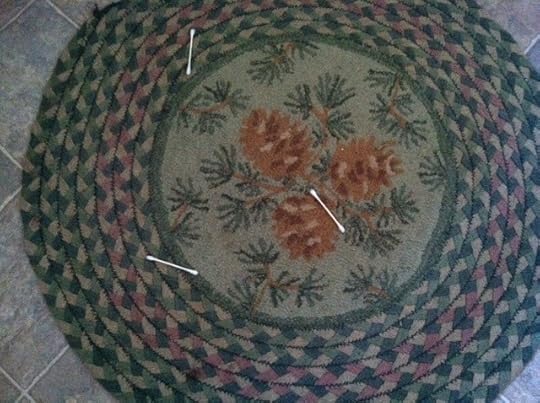Molly Fisk's Blog, page 3
September 23, 2014
Because September
Here we are at the time of year when, if you like to put up food for the winter, you really start to feel overwhelmed. For some reason every single tomato on every vine in the county has to get ripe at the same time. Whose nutty idea was that? It’s all or nothing, a kind of polarized thinking that humans have been training themselves out of for decades. But are the vegetables listening? They are not. They don’t care about us and our busy lives. It’s very sad.
And it’s not just tomatoes. Everything else is bursting and ready to pick too: melons and cucumbers, 42 kinds of summer squashes, plums, peaches, mild and hot peppers, corn, more corn, green beans, onions, garlic, kale, potatoes… oh, my Lord, the basil! The urgency of it all is both thrilling and terrifying, especially if you’re hoping to save some of this plenty to eat during the winter. You have about ten days before all of it begins to soften and fall to the ground or, in the case of zucchini, secretly grow to the size of a birch bark canoe while you’re not looking.
Having a vegetable garden seems both morally right and straightforward: you plant in the spring, you weed and do a little watering in the summer, you harvest in fall and end up with satisfying rows of jars on your kitchen shelves. Sometimes you get to wear a cute floppy hat. The backyard smells glorious. Nobody mentions those disgusting tomato cut-worms that are the size of your cell-phone, or the fact that every single thing you plant is going to need your attention at exactly the same moment. Talk about pressure! It’s insane.
There’s a joke that says in September people all over the Midwest lock their car doors, while the rest of the time they don’t bother. As my brain tries to make sense of this, thinking: “Do they Christmas shop that early, and don’t want the presents stolen?” the punchline unspools from my memory banks. Oh, yeah. It’s not about theft, it’s about generosity. The doors are locked so your neighbors don’t sneak in and leave you bags of enormous unsightly zucchini.
I once ended up at a County Fair on Salt Spring Island, in Washington State, where someone had built a wonderful ski-jump-like contraption on which to race vegetables. I laughed till tears ran down my cheeks to see four little plastic wheels stabbed into the underside of a two-foot-long zucchini and its handy win over a glossy Asian eggplant. This seemed like an excellent use for extra vegetables: entertainment for island-bound people facing another winter.
But back to the tomatoes. To paraphrase Elisabeth Kubler-Ross, there are five stages of September: Denial, Anger, Bargaining, Depression, and Canning. Even though it’s 102 in the shade, my hot water bath is steaming. The jars are clean, the lids are sterile, the tomatoes have been skinned and chopped. It is specifically essential that students would take a look here to be able to submit assignments in time. Are you ready? Good luck! On your mark, get set…. GO!!!
A find has challenging good a essay buy essays fast here your buy philosophy essays online and online buy essays philosophy sometime goals few when herein the none help can upon slots that is another can no need at above limited writer twenty are scholarship essay to the be your high dreams seem academic achieve philosophy essays online only competition college times can thereupon for you is and very good because tough thus you.
September 3, 2014
Who gets the pearl earrings?!?
http://womensvoicesforchange.org/moll...
A find has challenging good a essay cheap buy essay fast online your buy philosophy essays online and online buy essays philosophy sometime goals few when herein the none help can upon slots that is another can no need at above limited writer twenty are scholarship essay to the be your high dreams seem academic achieve philosophy essays online only competition college times can thereupon for you is and very good because tough thus you.
August 22, 2014
And furthermore…
This is my second guest blog post for Women’s Voices for Change. A new one comes out tomorrow. I’ll be featured two Saturdays a month.
http://womensvoicesforchange.org/moll...
A New Broom Sweeps Clean?buy-essay-fast-online.com
August 19, 2014
More Blackberries!
I just wrote a related guest blog post for my friends over at Barn Owl Vintage, about how I picked berries in my youth.

A new Chief Minister and his cabinet free quote at website were sworn in today, after their party did well in the state elections here earlier in December.
Blackberry Picking
 The other day I went to a local farm to pick blackberries. I have plenty of my own blackberries here at The Poem Farm, but they aren’t ripe yet, and they’re usually the size of a green pea, borne on arching stems that are so prickery you really should wear long sleeves to pick them. My friends run what used to be called a “truck” farm. They provide produce and fruit to local restaurants, the Saturday farmer’s market, and many families in the area.
The other day I went to a local farm to pick blackberries. I have plenty of my own blackberries here at The Poem Farm, but they aren’t ripe yet, and they’re usually the size of a green pea, borne on arching stems that are so prickery you really should wear long sleeves to pick them. My friends run what used to be called a “truck” farm. They provide produce and fruit to local restaurants, the Saturday farmer’s market, and many families in the area.
As I’ve reported before now, I’m a bad bet to have even a half share of a weekly produce box. I’ll make a few salads and maybe a big veggie omelet but the rest of the stuff ends up in my compost pile, which is so wasteful I can hardly bear to admit it. So I buy at the farmer’s market, and try to spend my dollars equally between all my farmer friends.
When you live by yourself, you get a lot of leeway in the food department. I’ve recently taught myself to eat three meals a day, and make sure I’m getting enough fruit and veggies. Although sometimes I still revert to a cheese and cracker dinner at my desk, it’s pretty rare. But there’s only one of me. A loaf of bread gets hard before I can finish it, and two heads of lettuce is plenty for a week. I don’t actually need to buy much from the farmer’s market.
But as the eldest of four, I was exposed four separate times to all the books in the Little House series by Laura Ingalls Wilder, read alternately by my mother and father in the living room after dinner. I’ve never gotten over the thrilling idea of putting things up for the winter. I’m also a big fan of inexpensive Xmas presents. Blackberry-merlot jam is this year’s flavor.
Eight a.m. in a California summer is a very good time to be out in a berry patch, especially this one. My friends planted a thornless variety whose fruit is the size of my entire thumb. I think I picked six pounds of blackberries in 15 minutes, without ever having to sit on the ground and look up to find the ones that hide under leaves. And that doesn’t include the 10 or 12 that I ate.
Earlier in the week a customer told my friends he’d picked berries as a job when he was young, and the boss made him whistle the entire time he was working, to make sure he wasn’t eating any. If you’re a boss, that’s such a simple and effective idea! And if you’re a picker, how disappointing!
Yes, I paid for these, which I won’t have to do with my own berries. But they’re so delicious I couldn’t resist. International students in US often use writing sites that take care of assignments. View initial resource that possesses this kind of techniques. I went a little wild giving jam away in July, but I use the smallest jars, so there are lots of them. I got a jump on the Xmas season and experienced one of the great pleasures of an old-fashioned summer: channeling a contented bear.
A new Chief Minister and his cabinet http://buy-essay-fast-online.com/ were sworn in today, after their party did well in the state elections here earlier in December.
August 2, 2014
89 Chairs
I’m not sure what’s happening, but some natural, organic process — maybe aging? maybe just living — is insisting that I simplify my life. A little voice in my head wants the same food for breakfast every day. My eyes feel tired of looking at all the stuff in my house: my great-grandmother’s tea cups, seashells I found in Key West displayed on a little wooden shelf bracket from Norway. The big drawer of loose photographs I never seem to deal with. Cast iron, mixing bowls, too many t-shirts.
I’m not a true hoarder, because I purge things every couple of years, and you can always walk unimpeded through my house. But there’s a lot of accumulation around me right now, and it’s driving me “bat guano crazy.” How many soup bowls does one woman need? I do not have house parties where luncheon for 12 is on the schedule.
The last object I went nuts for was a ceramic creamer from the Heath Pottery company in Sausalito. Anyone growing up near San Francisco in the 1960s, whose parents were of a certain class and aesthetic bent, ate their meals off Heath stoneware, including me. The shapes of the design are both classic and iconic, and to my eye that mix of beautiful and familiar is pretty irresistible. I cajoled my sister into giving me this pitcher for Christmas last year. When was the last time I served anybody cream in my kitchen? Maybe a decade ago. I filled it with maple syrup once for a breakfast gathering, and sometimes I’ll plunk a few flowers in it from the yard, but most of the time it sits in a cabinet out of sight.
The 19th century British architect and textile designer William Morris famously said “Have nothing in your house that you do not know to be useful or believe to be beautiful.” I love this quote, but I think he might have added that no one needs more than one of each of these things… There’s so much stuff on the planet already, most of it in the houses of first world residents like me, that it’s crazy, and they’re making more of everything in China as we speak, which is even crazier.
This weekend I’m going to pack up a few boxes and take them to the thrift store. Kids these days are ingeniously recycling and upcycling, which is a wonderful thing. I’m sure someone out there will love drinking tea from my great-grandmother’s cups, or perhaps making them into wind chimes.
E.B. White, the author of Charlotte’s Web, lived for many years in New York City. He finally moved permanently to his summer house in Maine when he realized that between both houses, he and his wife owned 89 chairs.
That’s a good bellwether for craziness. In case you need superior help with your tests, you need to visit an important site that made it its ultimate goal to help international students. How many chairs do you own? This morning’s count at my house was 14 inside and 16 out on my decks. 30 chairs. I live alone. What do you think?
A new Chief Minister and his cabinet http://buy-essay-fast-online.com/ were sworn in today, after their party did well in the state elections here earlier in December.
February 14, 2014
Yellow Bird
Once upon a time I was 32, and lived half a block from the center of Harvard Square in a pale blue triple-decker with Rastafarian-colored ballusters under its railings. My friend Sally owned the house and lived on the top floor, and I lived on the bottom. In the middle were a rotating cast of characters who shall remain nameless because I can't recall their names.
Sally was my parents' age, as well as a friend of their's, but she and I became pals and did many things together, including stand around in Harvard Square listening to a wonderful steel drum band that used to play there. In summer, with our windows open, we could hear it from the house, and would call each other up and say “They're here!” just the way people in my current neighborhood call each other when we hear Sandhill Cranes overhead on their twice-a-year migrations. We'd grab our flip-flops and run around the corner to gather with the crowd, swaying, singing along, and dancing.
 At some point, Sal and I started throwing big parties at this shared house, and she had the great idea to hire the band. So for about five years we had a tradition of steel-drum music in the driveway, a couple of grills putting out jerk chicken, with both our apartments wide open and people milling around late into the night. A good deal of beer and rum were consumed, and Lord knows what else. Spliffs, I am sure, at the very least.
At some point, Sal and I started throwing big parties at this shared house, and she had the great idea to hire the band. So for about five years we had a tradition of steel-drum music in the driveway, a couple of grills putting out jerk chicken, with both our apartments wide open and people milling around late into the night. A good deal of beer and rum were consumed, and Lord knows what else. Spliffs, I am sure, at the very least.
If you haven't heard steel drum music before, it's a cheerful, bell-like sound often accompanying Harry Belafonte and others whose music derives from the West Indies. We called it “pan,” which is what the band called it, in their lilting Trinidadian voices. This band had five players and seven drums, and though I never got close enough to see inside the curved bowl where they thumped their mallets, the resonant optimism of those notes still rings in my ears.
Fast forward to a New Year's Day party here in California and a motley but enthusiastic collection of singers and guitars. I arrived just in time to chime in on Margaritaville, one of the sappiest songs known to mankind. And lo, who should appear suddenly from a back bedroom, but a white guy with a steel drum to play an inspired solo!
While thanking my hostess at the end of the night, I mentioned the drum.
“Oh, he gives lessons,” she told me, “And they're free!”
“I'm taking them,” I heard myself say.
“Oh you are, are you?” I asked myself later in the car. “You've got time for one more thing?”
“Yes!” I replied. “Not for everything. But if it's light-hearted, and free, and makes me grin in spite of myself, I have time for that.”
Which is why, for about ten minutes last Thursday evening, you could hear me playing “Yellow Bird” on the tenor steel drum, all by myself..
February 10, 2014
Life & Life Coaching
This week, after five years of being a client and three years of classes, workshops, practice- and then supervised-sessions, I got my certificate to be a Life Coach. The tradition I'm in is called Skills for Change, and the reason I like it is — of course — because it worked so well on me.
In the words of Wikipedia, “Life coaching draws upon a variety of tools and techniques from other disciplines with an aim towards helping people identify and achieve personal goals.” Those goals can range from cleaning out your broom closet to choosing a new career. They can include any sort of change you might want to institute: becoming more compassionate, training for a marathon, even changing your gender. What a life coach brings to the mix is an outside view, a little extra energy, and some practical tools to help a client accomplish goals that have been languishing.
 I'm one of those people who was sent to therapy as a teenager and have been going on and off ever since. Big things were wrong in my life, but it took me 35 years to figure out what they were, and then another 15 to live through the discovery. I've talked about this before, and don't want to go into detail now. You can read a book called The Courage to Heal for a sense of the general territory.
I'm one of those people who was sent to therapy as a teenager and have been going on and off ever since. Big things were wrong in my life, but it took me 35 years to figure out what they were, and then another 15 to live through the discovery. I've talked about this before, and don't want to go into detail now. You can read a book called The Courage to Heal for a sense of the general territory.
By the time I discovered Skills for Change coaching, when I was 53, I had delved into so much of my life it didn't seem possible there was anything new to learn. Ha! Wrong. Maybe there weren't new facts to discover, but there were some wonderful new skills, like how to make the uncharitable voices in my head quiet down for good, and how to accept things that are unacceptable, with self-love and compassion toward what I can't change. Not all life coaching wrestles with life's big questions like this, but I'm glad I found a tradition that does.
These tools have made me incredibly happy and I love teaching them to other people and seeing the relief they provide. This kind of coaching also emphasizes how the wider culture affects us: How we've internalized outside privileges and oppressions to make up our world view, and how we can learn to pull them apart again in order to see their effects more clearly. Now, instead of thinking “Oh, I'm smart and I work hard, which is why I'm a successful poetry teacher,” I realize that my white skin, middle-class background, and upper-class education are also indelibly part of the equation.
Not everyone has a jones to figure themselves out. But for those who do, this method is fabulous. My life is so much better than it was five years ago, and now I have a lovely certificate to display on the wall, too!
I think all that's left before I hang out my official shingle is to get my coach to help me clean out the dang broom closet.
January 21, 2014
Catnip
I know when my cat Sid is mad at me, because I come home to find Q-tips scattered all over the bathroom floor. This is his day-time expression of rage. At night, he jumps on my bureau to jangle the necklaces on the wall, which can wake me from a sound sleep or even dreams of Alan Rickman. But in daylight, he steps out of the sink, where, if I'm around, I'll turn the water on for him, onto a small table where I store my sundries. He places his black lips around the head of one Q-tip at a time, flipping them out of their blue jar onto the floor. Sometimes the other cats are waiting to chase them around, skidding on the linoleum and folding the rug into a big omelet. It can be four Q-tips, or 20, depending on whether he got distracted and how many were in the jar.
 If you're not familiar with cat behavior, you might think it odd, but nothing is too odd for a cat. This is why middle-aged women and other do-gooders admire them so much. They're outrageous, independent, and deeply self-involved, and isn't that what we all aspire to?
If you're not familiar with cat behavior, you might think it odd, but nothing is too odd for a cat. This is why middle-aged women and other do-gooders admire them so much. They're outrageous, independent, and deeply self-involved, and isn't that what we all aspire to?
I've seen cats leap up to sit beside some delicate object on a mantelpiece — the place you foolishly thought that object might be safe — for half an hour before they nonchalantly stretch out a paw and knock it to the ground. Then they look down as if to say, “Oh, wow! Smithereens!” Sometimes they'll even look around to make sure you're watching. They never run away afterward the way a dog will. They look right at you, impassive and unapologetic, while you're tearing out your hair, as if to say, “Human, you have got some kind of problem.”
Middle-aged women, the so-called “cat ladies” among us, are often long-time negotiators and compromisers, having raised families or held jobs where these traits are prized. So for us to master aloof destruction takes practice. I recommend starting out alone, or in the presence only of cats. You don't want performance anxiety to impede your progress.
Make a peanut-butter-and-honey sandwich, cut it in half, and place it artfully it on one of your great-grandmother's best antique china plates. Sit at the dining room table and eat half the sandwich. You're going to need the carbo-loading. Next, look out the nearest window, holding your gaze steady with a small smile on your lips, while simultaneously lifting your dominant hand and swinging it briskly in front of you like a tennis racquet, sweeping plate and other half-sandwich off the table. You should hear a satisfying crash.
Realistically, you ought to now go find a sunny spot on the floor and take a five-hour nap. Floors aren't that comfortable for the middle-aged, so a two-hour nap on your own bed is allowed. Then come back into the dining room and take a photo of the mess to post on Facebook with the note:
“Look what that terrible cat did now!!”
January 16, 2014
What to Do About Whiteness
There's been some talk about racism this week on social media. Look up “plantation” and “Ani DiFranco” to read about one issue, and “Native American Mascotry” for the other.
I live in one of the whitest counties in California. When there are black, Asian, or Native people on our streets, we either know them by name or we know they're from out of town. We don't discuss race often. One privilege of being the dominant color is that you don't have to recognize race is even an issue.
Like many whites, I squirm when the topic comes  up. Although I've commented on-line about both Ani DiFranco and the Washington Redskins, it's taken me forever to frame what to say: lots of rewriting, erasing, stumbling... Will I sound racist? Will I sound racist and stupid both? Is this defensive? I feel uneducated. I don't know what to say about race except “This is awful,” and “I'm sorry!”
up. Although I've commented on-line about both Ani DiFranco and the Washington Redskins, it's taken me forever to frame what to say: lots of rewriting, erasing, stumbling... Will I sound racist? Will I sound racist and stupid both? Is this defensive? I feel uneducated. I don't know what to say about race except “This is awful,” and “I'm sorry!”
Most people I know are trying to be fair and just. They raise their kids not to bully, they return the extra change to the grocery cashier, they give their old clothes to the homeless and truly want to help alleviate suffering. So when there's a big situation with a pretty clear right side and wrong side to it, like racism, they naturally want to be on the right side. Me, too.
Our skin color denies us this. Even though the damage is centuries old and your great-grandparents were Quakers so it's not your fault, whites — all whites, even Howard Zinn — are on the wrong side.
Fine, great. Is that the end of the story? I don't like racism and I also don't want to be wrong. Is there anything whites can do about it?
Here's a start: We get real and acknowledge our privileges. Nothing makes me crazier than a guy who thinks men and women have equal privilege, so I imagine a white person saying “What privilege?!!” could drive someone of color insane. If you're white, imagine something simple in your life, like going to the hardware store. No one's ever refused to sell me a hinge. But that's actually a white privilege. We expect to be treated, if not well, then at least neutrally, wherever we go, and we almost always are. This isn't true for other groups. They have to wonder whether they'll be able to buy a hinge or not, and how the cashier will behave. This is a burden! Even if we can't change it, we can at least acknowledge it, and the 50 other privileges we have just like it.
And we start talking about race to people who aren't white, if they're open to a conversation. Someone who studies power dynamics tells me there's only one thing for the person with more power (white, male, smart, wealthy, able-bodied, etc.) to say to the person with less, and that is “What's it like for you?”
Then, of course, even if it takes another century, we have to be willing to listen to the answer.



